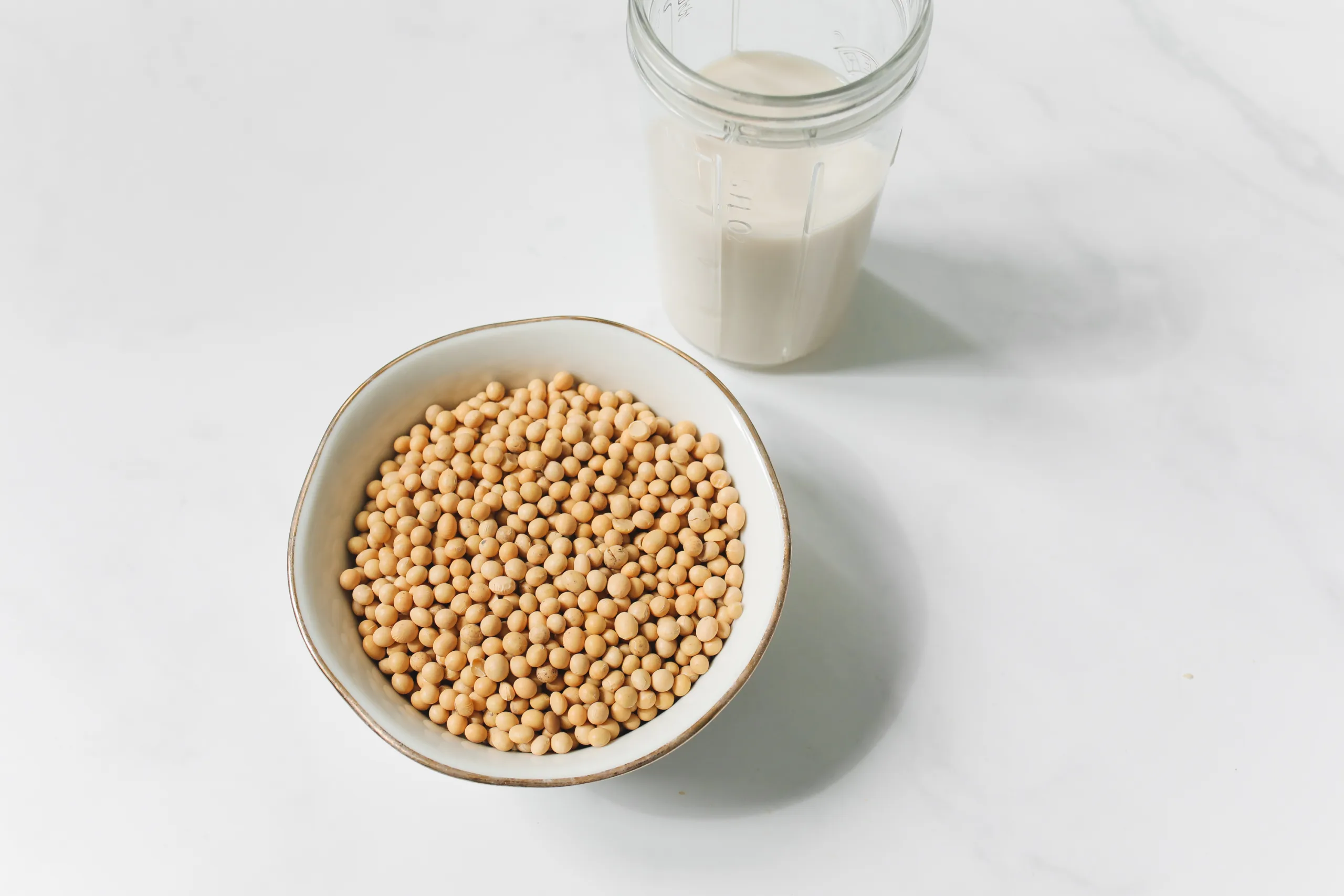Is Soy Milk Low Fodmap?
Are you looking for a dairy-free milk alternative that is also low FODMAP? Soy milk could be the answer! But is soy milk low FODMAP? This article will answer that question and provide you with all the information you need to make an informed decision about whether soy milk is suitable for your diet.
Soy milk is a popular alternative to dairy milk, made from either whole soybeans or soy protein isolate. It has numerous health benefits, including providing a good source of plant-based protein, being low in saturated fat, and containing a range of essential vitamins and minerals. It’s also suitable for those with lactose intolerance or a vegan diet.
But is soy milk low FODMAP? This article will explain what the FODMAP diet is and provide an overview of the scientific research on whether or not soy milk is suitable for those following this diet. We’ll also discuss how to choose a suitable low FODMAP soy milk product and provide some tips for incorporating it into your diet.The Low FODMAP Diet is a dietary approach used to reduce symptoms in those with irritable bowel syndrome (IBS) and other digestive disorders. It involves avoiding certain carbohydrates, such as fructose, lactose, fructans, and polyols, which are poorly absorbed in the small intestine. The goal of the Low FODMAP Diet is to reduce symptoms of abdominal pain, bloating, gas, and diarrhea associated with IBS.
FODMAP
FODMAP is an acronym that stands for Fermentable Oligosaccharides, Disaccharides, Monosaccharides and Polyols. These are a group of short-chain carbohydrates found in many common foods such as wheat, onion, garlic, apples and dairy products. FODMAPs are not absorbed well by the small intestine and can cause gastrointestinal distress in some people.
For those with digestive problems such as irritable bowel syndrome (IBS), FODMAPs can be particularly problematic since they are highly fermentable and can lead to increased gas production, bloating, abdominal pain and changes in bowel habits. A low-FODMAP diet involves avoiding foods high in FODMAPs or limiting their intake in order to reduce symptoms. This type of diet has been shown to be effective in reducing IBS symptoms in some people.
Low FODMAP Foods
Low FODMAP foods are an important part of the low FODMAP diet. These foods are low in fermentable carbohydrates, which can help reduce symptoms of irritable bowel syndrome (IBS). Common low FODMAP foods include fruits such as bananas, grapes, oranges, and strawberries; vegetables such as carrots, potatoes, broccoli, and spinach; lean proteins such as chicken, turkey, and fish; and non-dairy milks such as almond milk and rice milk. Many whole grains can also be part of a low FODMAP diet including quinoa and oats. Additionally, some legumes like green beans and lentils are low FODMAP options. Eating these foods in moderation can help ensure that you get all of the essential nutrients while still managing your IBS symptoms.
It is important to note that certain high-FODMAP foods can be tolerated in small amounts by some people with IBS. These include certain nuts and seeds (such as walnuts or pumpkin seeds), garlic-infused oils, high-fructose fruits (including apples and pears), certain dairy products (like yogurt or cheese), beans and legumes (like chickpeas or black beans), certain grains (like wheat or rye), and sugar alcohols (like sorbitol or xylitol). The best way to find out which high-FODMAP foods work for you is to speak with a registered dietitian who specializes in the low FODMAP diet.
Click here to preview your posts with PRO themes ››
Is Soy Milk Low FODMAP?
Soy milk is a popular dairy-free alternative to traditional cow’s milk. It’s made from soybeans, which are naturally low in FODMAPs, making it an attractive choice for those following a low FODMAP diet. However, due to the processing of soy milk, it can contain added sugars that may not be suitable for those with IBS.
Most commercial brands of soy milk contain lactose and other sugars, such as glucose and sucrose. These added sugars can cause digestive distress for those with IBS. It’s important to read the label carefully and look for unsweetened or reduced sugar varieties when buying soy milk.
When choosing a brand of soy milk, look for one that is made from organic, non-GMO soybeans. This will ensure that the product does not contain any additives or preservatives that could trigger symptoms in those with IBS. If possible, try to find a brand that is free from added sweeteners and flavorings as these can also contain high levels of FODMAPs.
It’s also important to note that some people may have difficulty digesting the proteins in soy products due to an allergy or intolerance. If this is the case, then it’s best to avoid soy milk altogether.
Overall, unsweetened or reduced sugar varieties of soy milk are generally considered low FODMAP and safe for those following a low FODMAP diet; however, other factors such as allergies and intolerances should also be taken into consideration when choosing a product.
Soy Milk and IBS Symptoms
Soy milk is a popular plant-based alternative to dairy products, and some research suggests that it may be beneficial for those dealing with irritable bowel syndrome (IBS) symptoms. Soy milk contains high levels of protein and dietary fiber, which can help to reduce the severity of IBS symptoms. Additionally, soy milk is low in saturated fats, which can also benefit individuals with IBS. Studies have shown that soy milk can improve digestion and reduce abdominal pain associated with IBS.
The probiotic properties of soy milk may also help to reduce IBS symptoms. Probiotics are live bacteria that are important for maintaining a healthy gut microbiome. They can help to reduce inflammation in the gut, which can reduce stomach ache and other digestive issues associated with IBS. Studies have demonstrated that probiotics found in soy milk may be able to reduce the severity of IBS symptoms.
Soy milk also contains several compounds that may be beneficial for individuals with IBS. For example, it contains isoflavones, which have been shown to promote gut health. Additionally, soybean oil has anti-inflammatory properties that may help reduce the severity of IBS symptoms such as abdominal pain and bloating.
Click here to preview your posts with PRO themes ››
In conclusion, soy milk may be beneficial for those dealing with irritable bowel syndrome (IBS) symptoms due to its high levels of protein and dietary fiber, low levels of saturated fats, probiotic properties, and compounds such as isoflavones and soybean oil which have anti-inflammatory properties. As always though, it’s important to talk to your doctor before making any major changes to your diet or lifestyle if you’re dealing with IBS symptoms.

Non-Dairy Alternatives for IBS Sufferers
IBS, or Irritable Bowel Syndrome, can be a difficult condition to deal with. Unfortunately, dairy can often worsen IBS symptoms, such as bloating and abdominal pain. Fortunately, there are plenty of non-dairy options available for people with IBS. Soy milk is one of the most popular alternatives, as it contains a lot of the same nutrients found in dairy milk. It is also very low in saturated fat and contains no cholesterol. Coconut milk is another option that provides healthy fats and is lactose-free. Almond milk is also rich in nutrients and low in calories, making it a great option for those with IBS. Hemp milk is high in omega-3 fatty acids and calcium and is naturally lactose-free. Rice milk has a bit more sugar than other non-dairy milks, but it contains no saturated fat or cholesterol. Oat milk has a creamy texture and can be used as an alternative to dairy in many recipes. Finally, quinoa milk is rich in protein and fiber, making it an ideal choice for those with IBS who need more nutrition from their diet. All of these non-dairy alternatives can help make life easier for those living with IBS while still providing crucial nutrition to the body.
The Benefits of Soy Milk for IBS Sufferers
Irritable bowel syndrome (IBS) is a common digestive disorder that affects many people, often causing pain and discomfort. While there is no cure for IBS, making dietary changes can help to reduce symptoms and improve overall health. One such dietary change that may be beneficial is the substitution of soy milk for cow’s milk. Soy milk has been found to have numerous benefits for those suffering from IBS, and it can provide relief from many symptoms associated with the condition.
One of the main benefits of soy milk is that it is low in fat and contains no cholesterol, making it an ideal choice for those on a low-fat diet. Lower fat diets are often recommended by doctors to help alleviate symptoms of IBS, as high-fat foods can aggravate gastrointestinal problems. Soy milk also contains more fiber than cow’s milk, which can help to regulate digestion and reduce constipation, another common symptom of IBS.
In addition to its low-fat content and high fiber content, soy milk also contains phytoestrogens which may have a positive effect on IBS symptoms. Phytoestrogens are compounds found in plants that have hormone-like properties; they are believed to act as a natural anti-inflammatory agent which can reduce inflammation in the digestive tract. Studies have shown that phytoestrogens may be effective in reducing abdominal pain associated with IBS, as well as reducing bloating and gas.
Finally, soy milk is a good source of protein, which helps to maintain muscle mass and keep energy levels up throughout the day. Protein also helps to keep blood sugar levels balanced; this is important for those with IBS as blood sugar fluctuations can worsen symptoms such as diarrhea or constipation. Furthermore, soy milk does not contain lactose like cow’s milk does; this makes it an ideal choice for those who are lactose intolerant or who experience digestive issues when consuming dairy products.
Click here to preview your posts with PRO themes ››
For those suffering from Irritable Bowel Syndrome, incorporating soy milk into the diet may provide some relief from symptoms while still providing nutritional benefits. By substituting soy milk for cow’s milk or other dairy products, IBS sufferers can enjoy all the benefits of a healthy diet without sacrificing taste or nutrition.
Potential Risks of Soy Milk Consumption for People with IBS
IBS, or Irritable Bowel Syndrome, is a chronic gastrointestinal condition that affects the digestive system. While there is no clear cause of IBS, it can be triggered by stress, poor diet, and certain foods. One of the foods that may trigger IBS symptoms is soy milk. Soy milk is made from soybeans and contains many beneficial nutrients such as calcium, protein, and vitamins. However, it also contains certain compounds that could potentially aggravate IBS symptoms.
Soy milk contains phytoestrogens which are plant-based compounds that mimic the hormone estrogen in the body. For people with IBS, these compounds can increase inflammation in the gut and trigger symptoms like bloating, cramping, and diarrhea. Additionally, soy milk may also contain oligosaccharides which are complex carbohydrates that can be difficult to digest for people with digestive sensitivities. Consuming too much of these carbohydrates could cause gas and bloating in those with IBS.
In addition to the potential risk of exacerbating IBS symptoms, some studies have suggested that soy may interact negatively with certain medications used to treat IBS such as anti-diarrheal drugs or laxatives. Therefore it’s important to discuss any potential interactions with your doctor before consuming large amounts of soy milk if you are taking medication for your IBS symptoms.
Overall, while soy milk does contain beneficial nutrients like protein and vitamins for people with IBS it’s important to consider potential risks before adding it to your diet regularly. People with IBS should talk to their doctor about their individual dietary needs before making any changes as some people may find soy milk aggravates their symptoms while others may find it helps them manage their condition better.

Conclusion
Soy milk is generally considered low FODMAP and can be enjoyed in moderation. It is important to note that many soy-based products, such as soy yogurt, are not considered low FODMAP. It is also important to read labels carefully as some brands of soy milk may contain high FODMAP ingredients such as honey or agave.
For those who are concerned about their FODMAP intake, it is best to consult a qualified healthcare professional for further advice on which foods may be best for them. Furthermore, it is recommended to check the ingredients list on food labels to ensure that the product does not contain any high FODMAP ingredients before consuming it.
Overall, soy milk can be a great choice for those looking for an alternative to dairy milk and wanting to reduce their consumption of high FODMAP foods. However, because everyone’s dietary needs are different, it is important to speak with a healthcare professional before making any changes to your diet.

